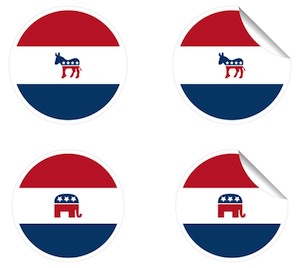Why Republicans Are Disciplined and Democrats Aren’t
When GOP leaders tell rank-and-file Republicans to call Obamacare’s cost controls “death panels," or to say the rich are “job creators," or the poor are “takers rather than makers," they all repeat the same words. Democrats never stick to the same message. They rarely even say the same thing the same way twice. In fact, their messages often conflict.
This post originally ran on Robert Reich’s Web page.
As we head toward renewed battles over the debt ceiling, sequester, and government funding, it’s important to understand why Republicans are disciplined and Democrats aren’t.
For the past five years of the Obama administration Republicans have marched in lockstep to oppose just about everything Obama and the Democrats have proposed. Yet the Democrats rarely march together. Recently, for example, 22 Democrats in the House joined every Republican in voting to delay the individual mandate in Obamacare.
When Republican leaders tell rank-and-file Republicans to call Obamacare’s cost controls “death panels,” or to say the rich are “job creators,” or the poor are “takers rather than makers,” they all repeat the same words. (Frank Luntz, their message consultant, once said: “There’s a simple rule. You say it again, and you say it again and you say it again, and you say it again, and you say it again, and then again and again and again and again, and about the time that you’re absolutely sick of saying it is about the time that your target audience has heard it for the first time.”)
Democrats never stick to the same message. They rarely even say the same thing the same way twice. In fact, their messages often conflict.
To be sure, the Tea Partiers in Congress have challenged the GOP leadership. But that challenge is really about who should have the authority to impose discipline over the Party. The firebrands are bucking the old establishment with their own new establishment. Democrats, by contrast, buck their leaders all the time. And they do it as individuals, lone wolves and free agents.
Republican discipline and Democratic lack of discipline isn’t a new phenomenon. As Will Rogers once said, “I’m not a member of any organized political party. I’m a Democrat.”
The difference has to do with the kind of personalities the two parties attract. People who respect authority, follow orders, want clear answers, obey commands, and prefer precise organization and control, tend to gravitate toward Republicans.
On the other hand, people who don’t much like authority, recoil from orders, don’t believe in clear answers, often disobey commands, and prefer things a bit undefined, tend to gravitate to the Democrats.
In short, the Republican Party is the party of the authoritarian personality; the Democratic Party is the party of the anti-authoritarian personality.
In “Authoritarianism and Polarization in American Politics” (Cambridge University Press, 2009), Jonathan Weiler, professor of international studies at UNC Chapel Hill and his co-author, Marc Hetherington, use statistical models to determine whether someone is a Republican or Democrat. It turns out that the best predictor of party affiliation is someone’s score on an authoritarian personality scale that measures many of the traits I mentioned above.
This means Republicans will almost always be more disciplined about voting and messaging than the Democrats. Which gives the GOP an advantage in times like this, when the two parties are at war with each other — and when so many Americans, angry and confused, are looking for simple answers.
Robert B. Reich, chancellor’s professor of public policy at UC Berkeley, was secretary of labor in the Clinton administration. Time magazine named him one of the 10 most effective Cabinet secretaries of the last century. He has written 13 books, including the best-sellers “Aftershock” and “The Work of Nations.” His latest, “Beyond Outrage,” is now out in paperback. He is also a founding editor of The American Prospect magazine and chairman of Common Cause.
Your support matters…Independent journalism is under threat and overshadowed by heavily funded mainstream media.
You can help level the playing field. Become a member.
Your tax-deductible contribution keeps us digging beneath the headlines to give you thought-provoking, investigative reporting and analysis that unearths what's really happening- without compromise.
Give today to support our courageous, independent journalists.






You need to be a supporter to comment.
There are currently no responses to this article.
Be the first to respond.